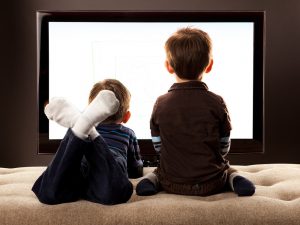Have you ever seen in others or felt for yourself an extraordinary amount of moodiness? Restlessness? A more significant inability (than average) to focus on tasks that require concentration? Overly emotional feelings or outbursts? Impulsive and fidgety?
Yes, these symptoms describe those of us during a period of stress. They can also specify what a child or teen may be experiencing after several consecutive in front of a screen, either watching tv, doing school work on the computer, or playing video games on an iPad or phone.
What is the reason that this occurs you may be wondering? Screens like computers, televisions, IPads all have a strange and powerful effect on both children and adults. As adults, it is challenging to limit the amount of time that we may find ourselves in front of a screen since many of us work on computers. However, finding a way to combat screen time in children, especially during the summer months, can be simpler overall. As parents, we need to be able to set limits and stick to them.

However, this may not always be as easy as it sounds! Screens can be addictive, particularly for young children. And while you may think that might sound extreme, in May 2013, they added to the Diagnostic and Statistical Manual of Mental Health Disorders, published by the American Psychiatric Association, the diagnosis of “Internet Use Disorder” (IUD). There was research done to demonstrate not only that screen time can become a regular habit for many individuals but that it has the potential to also disrupt their daily life. The continuing list of research shows neurological evidence to back up that claim that, like other addictions, screen time creates significant changes in brain chemistry. We know that it does increase the release of the neurotransmitter dopamine in the brain, which is known as the pleasure chemical. This dopamine release can play a role in the brain like sugar addiction, or other harder substances. When children develop a dopamine habit during early childhood, either through food/candy or now computer games, more severe problems may develop as they age.
The effects of increased screen time have been known for years; however, it is estimated by the American Academy of Pediatrics that, on average, children spend about seven hours each day looking at a screen; on a computer, smartphone, television, or a video game.
And this was BEFORE the pandemic of Covid-19! Even though we have known this fact and are getting more research to back this up, it seems that now during this pandemic time, children and teens are gaining and maintaining frequent access to screens of all kinds, and it is starting at younger and younger ages. There are many explanations as to why this continues to be the case, and the use of them for distance learning has only added to this list. Other reasons that I’ve heard from parents include:
1. It’s easy and convenient when I have things that I need to do
2. It’s educational games that they are on
OR
3. It helps my child focus better

And this last reason is the one where I cringe the most! Yes, It is true. Screen time is proven to encourage the release of ‘happy chemicals’ in the brain, as mentioned (Dopamine). Therefore, when we spend large amounts of time on tablets, smartphones, laptops, and applications like Twitter, Facebook, and Instagram, it can increase our desire to stay in front of the screen for hours on end, but it will start to change brains over time too. Since screen time stimulates dopamine in our brains once we stop using them, it can leave the person feeling anxious, irritable even angry, and they can become even more distracted.
I am an advocate in that screen and off-screen play MUST be incorporated in the day equally, especially for children throughout the summer.
There are also more guidelines on how much screen time children as young as two should have. Today, now that we quickly have to become more of a digital world with distance learning thrown into the mix, families and especially children and teens are exposed to more screen time than ever. Think about all the screen related devices that you may have in your household alone; Smartphones, tablets, laptops or computers, DS/Gameboys, or video games, are those that may quickly come to mind. These devices and screens, as well as the programs we utilize from them, either for work, educational or social, are all continually competing for time and attention and can easily take away from other activities and experiences we may have throughout a day. This is the increasingly more significant issue at hand! The ever-growing time that screen use is now taking away from other interpersonal and hands-on play and activities. And don’t get me wrong, while all of these devices can host useful educational tools, some children (and parents) are overly relying on digital media to replace the other activities that are so needed for physical, mental and emotional development and growth.

More and more research out today demonstrates how the brain develops differently with excessive screen time, so screen time does indeed affect a child’s development. And while the research and facts are excellent, you may not be sure how on earth, you can change your family’s habits and pattern?!?! And more importantly, the biggest obstacle to doing this shift of mindset and behavior pattern in your household can include any of the following:
1. Not realizing to what extent that the screen time everyone was using was so addictive
2. Now with distance learning the benefits technology brings gives the additional use more justification
3. Sometimes it is nice to have your children entertained so you can do things that need to get done
4. Reducing screen time can involve an outright war in the home to get them to step away from their devices, so it has been easier to allow it to stay
In our clinic, we are continually seeing more and more children with issues related to poor emotional, mental and physical development in the areas of visual processing, fine motor skills, gross motor skills, posture or core control (especially as children lean over on screens and tablets) and interpersonal communication or social skills. These issues can all be addressed by doing programs and therapies like the ones we offer; however, it also can be corrected at home if some rules and guidelines were in place around the screen time.
If a child is inside playing or interacting with a screen, it means that they are not using their hands-on toys or tools like building with blocks or painting with real paints or running outside and playing.

These are the skills and activities that they need to incorporate daily to build up both muscle tissue and neurological pathways to develop and grow. Therefore, there is a need for an even approach and combination of technology and traditional hands-on play and skill-building so that everyone can benefit from both worlds.
The key for parents to be successful at screen time use is truly in just finding a fair balance. It is true that as we allow our children to keep up with technology, they will be learning new skills that will help them as they grow. However, too much screen use can prevent them from becoming proficient in social interaction and communication skills. You can do many things to help your kids find a balance between the time they spend on screens and the time they have off of them. For those that are older, working together with them to set practical and achievable limits around daily screen use can be helpful, especially if they see it is including your own.
For more ideas on ways to limit screen time use over the summer, click the link for Part 2 of this blog: Ways to Help Limit Screen Time Use The Summer After COVID!
As specialists trained in working with children, parents, and the family, the Sensory Stepping Stones clinic can help to assess and combat the behaviors and habits that you are seeing with your child or teen when it comes to screen overuse and abuse. We are here to help you overcome and work through the pitfall and traps that all parents can fall into when it comes to screen time and are here to help.
Sign up for your Free Consultation today!
Join our Facebook Group, and like/follow our Facebook Page or Instagram for more articles and tips!
Melissa Bianchini is a licensed clinical social worker in New York and the owner and executive director at Sensory Stepping Stones, LLC. Her career has spanned over 20 years working with children and families around neurological processing concerns, stress-related trauma, and anxiety. Her passion in life is to make a difference in the lives of kids and families that she works with. It has led her spirit to create a facility that facilitates a holistic approach to overall health, wellness, and processing development for those 3 through 93 years young! To unwind and reconnect, Melissa enjoys spending time at home with her husband, Damian, and her dogs and cats, exercising, eating chocolate (of course!), and doing anything that involves nature!

